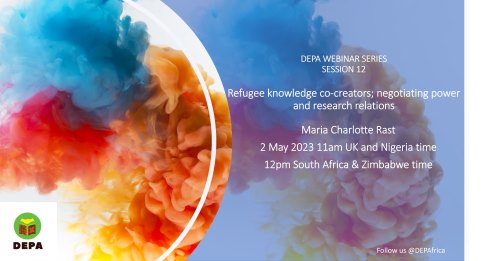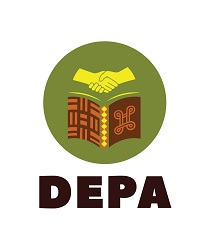DEPA (Decolonising Peace Education in Africa) webinar series aims to promote dialogue on diverse theoretical, conceptual, and methodological perspectives within Africa. Our next speaker is Maria Charlotte Rast.
Register now via Eventbrite
2 May, Tuesday, 11:00 UK and Nigeria time, 12:00 South Africa and Zimbabwe time.
Various researchers aim and claim to produce knowledge with instead of about people with a refugee background to better capture their perspectives and, consequently, co-create knowledge with more transformative potential. This requires researchers to collaborate more extensively with people with a refugee background, for example using co-creative research methods. Moreover, to avoid unintentional reproduction of dominant discourses and practices, researchers arguably need to reflect on and unsettle power issues affecting actual co-creation of knowledge. Accordingly, a great number of literature exists in which scholars reflect on co-creative research.
Yet, we know little about how people with a refugee background that act as knowledge co-creators themselves reflect on negotiating power and hierarchical relations permeating co-creative research. To learn more about their perspectives, I engaged with 13 people with a refugee background that had previously participated as knowledge co-creators in co-creative research practices. During interviews and workshop sessions, I discussed with them challenges and opportunities of co-creative research and especially their perspectives on negotiating power and hierarchical relations.
In this webinar, I will present participants’ reflections on challenges around knowledge co-creation. I will then discuss conditions participants identified for actual and meaningful knowledge co-creation. Finally, I will share some examples how knowledge co-creators not only reflect on but also negotiate research contents and processes and how, in that way, co-creative research may potentially challenge normalized assumptions and produce knowledge reflecting actual experiences of people with a refugee background. Last but not least, I am looking forward to hearing more about your experiences and to engage with you in an interesting exchange on knowledge co-creation.
Biography
Maria Charlotte Rast (she/her) obtained the titles Master of Law (summa cum laude) from the University of Bern, Switzerland, in 2014 and Master of Science (cum laude) in Sociology from VU Amsterdam, the Netherlands, in 2017. Since 2018, she is a PhD candidate at the Department of Sociology at VU Amsterdam, the Netherlands. Her PhD research focuses on the challenges and opportunities of co-creative civil society initiatives and research projects that strive for refugees’ societal inclusion. This qualitative study with co-creative elements is affiliated with the Refugee Academy of VU Amsterdam and the NWO-VICI research project ‘Engaged Scholarship and Narratives of Change’ of Prof. Dr. Halleh Ghorashi.


